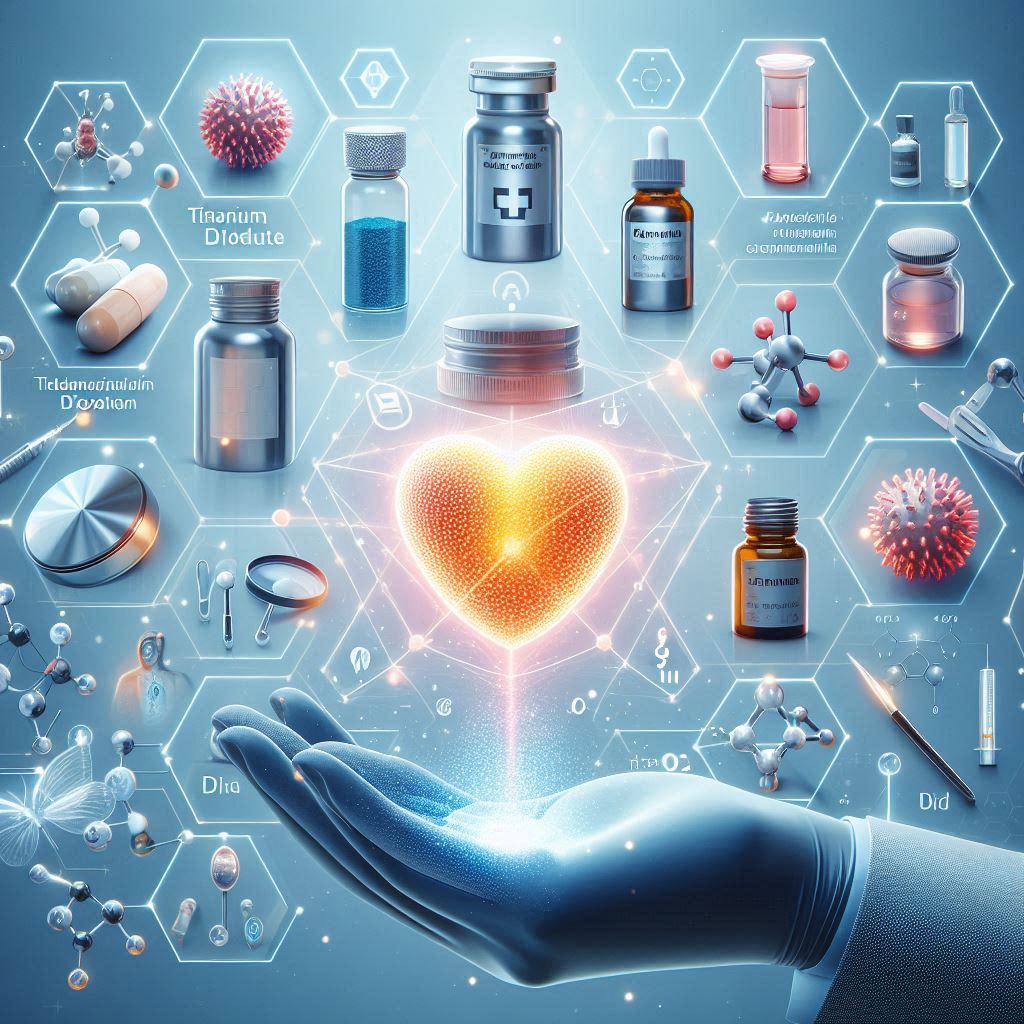
Titanium Dioxide Uses in Medicine and Skin Care 2025
Short Intro:
Titanium dioxide (TiO2) is a versatile compound with growing importance in medicine and skincare. It enhances implants, drug delivery, and skin protection.
What You’ll Learn:
- Applications of TiO2 in medical implants and devices
- Role in drug delivery systems and diagnostics
- UV protection and cosmetic benefits for skin
- Photocatalytic and antimicrobial properties
- Safety considerations for skin and human health
1) Introduction
Introduction: Titanium Dioxide Uses in Medicine and Skin Care
Titanium dioxide (TiO2) is a multifunctional compound with applications spanning medicine, cosmetics, and industrial sectors. Its unique properties—UV absorption, high refractive index, photocatalytic activity, and biocompatibility—make it indispensable for both therapeutic and cosmetic uses. As its use grows, it is critical to balance its advantages with environmental and health safety considerations. This article explores the practical uses of TiO2 in medicine and skincare while addressing its safety, performance, and future prospects.
Transitioning from general applications, the next sections delve into TiO2's industrial, medical, and skin-focused uses.
2) Titanium Dioxide Overview
Titanium Dioxide Overview: Properties, Structure, and Applications
SEO Snippet: Titanium dioxide is a high-performance inorganic compound with industrial, medical, and cosmetic uses due to its unique optical and chemical properties.
Titanium dioxide is a naturally occurring titanium oxide known for its three primary crystalline forms: anatase, rutile, and brookite. Its remarkable UV-blocking ability, high refractive index, and photocatalytic activity make it essential in manufacturing, cosmetics, electronics, and environmental technologies. TiO2 is also a semiconductor, expanding its use in advanced electrical and energy systems.
LSI Keywords: TiO2 properties, anatase, rutile, photocatalysis, biocompatibility, UV absorber, semiconductor applications
Applications:
- Cosmetics: Provides matte finishes in powders and creams
- Pigments & Coatings: Enhances brightness, opacity, and durability in paints
- Photocatalysis: Purifies water and air by converting pollutants
- Medical Implants: Ensures corrosion-resistant, biocompatible devices
- Food Additive (E171): Adds whiteness and opacity to products
- Photovoltaics: Improves electron transport in solar cells
External Links:
3) Titanium Dioxide Uses in Industry
Titanium Dioxide Uses in Industry: Manufacturing, Construction, and Electronics
SEO Snippet: TiO2 enhances paints, coatings, polymers, and electronics, providing opacity, durability, and UV resistance across industries.
Titanium dioxide is widely used in construction and manufacturing for its pigment properties and durability. It increases opacity and brightness in paints, coatings, and ceramics while preventing discoloration. In electronics, TiO2 functions as a dielectric material and electron transport layer in photovoltaics. Its environmental applications include photocatalytic water and air purification.
LSI Keywords: industrial pigment, TiO2 coatings, photovoltaic layer, ceramics, environmental cleanup, semiconductors
External Links:
- Materials Today on Titanium Dioxide
- Novin Trades Market View: TiO2 demand in construction and electronics is forecasted to grow steadily, driven by sustainable infrastructure projects.
4) Titanium Dioxide Uses in Medicine
Titanium Dioxide Uses in Medicine: Implants, Diagnostics, and Drug Delivery
SEO Snippet: TiO2 is a biocompatible compound used in implants, medical devices, drug delivery systems, and diagnostic imaging.
In medicine, titanium dioxide excels due to its biocompatibility, corrosion resistance, and versatility:
- Biocompatible Implants: Orthopedic and dental implants integrate seamlessly with tissue, providing long-term durability.
- Medical Instruments & Devices: TiO2 coatings enhance device safety, durability, and sterilization.
- Drug Delivery Systems: Nanoparticles enable targeted, controlled drug release, improving efficacy and reducing side effects.
- Diagnostic Imaging: TiO2-based contrast agents enhance CT scans and disease monitoring.
- Tissue Engineering: Serves as a scaffold material supporting cell growth and differentiation.
- Antimicrobial Coatings: Photocatalytic properties reduce pathogen growth on medical surfaces.
LSI Keywords: biocompatible implants, TiO2 drug carriers, tissue scaffolds, diagnostic agents, antimicrobial coatings, nanoparticle therapy
External Links:
- NCBI TiO2 in Biomedical Applications
- Novin Trades Market View: The medical sector continues to explore TiO2-based innovations for improved patient care.
5) Titanium Dioxide Uses for Skin
Titanium Dioxide Uses for Skin: Sun Protection and Cosmetic Benefits
SEO Snippet: TiO2 protects against UV radiation, improves cosmetic formulations, and is safe for sensitive skin.
Titanium dioxide is a key skincare ingredient due to its protective and aesthetic properties:
- Sun Protection: Physically blocks UVA and UVB rays, reducing risk of sunburn, aging, and skin cancer.
- Non-Irritating: Suitable for sensitive skin; less likely to trigger allergies than chemical sunscreens.
- Cosmetic Applications: Provides a matte finish, evens skin tone, and enhances opacity in makeup products.
- Photostability: Preserves effectiveness of active cosmetic ingredients over time.
- Oil Absorption: Controls excess sebum, ideal for oily or acne-prone skin.
- Safe for Sensitive Skin: Hypoallergenic formulations allow safe daily use.
LSI Keywords: sunscreen ingredient, cosmetic TiO2, UV blocker, sensitive skin, photostability, mattifying effect
External Links:
- FDA Sunscreen Regulations
- Novin Trades Market View: TiO2-containing skincare products are increasingly popular in dermatology and cosmetic markets.
6) Conclusion
Conclusion: Titanium Dioxide Uses in Medicine and Skin Care
SEO Snippet: Titanium dioxide offers versatile applications in medicine and skincare, from implants to UV protection and cosmetic enhancement.
Titanium dioxide is a versatile compound with significant potential in medicine, cosmetics, and industry. Its biocompatibility, UV-blocking properties, photocatalytic activity, and aesthetic benefits make it invaluable for implants, drug delivery, skincare, and cosmetic formulations. As research continues, sustainable and safe integration of TiO2 will ensure its long-term utility across multiple sectors.
LSI Keywords: TiO2 medical use, skincare protection, UV blocker, biocompatible implants, cosmetic additive, safe TiO2 use
External Links:
- ScienceDirect Titanium Dioxide Research
- Visit NovinTrades Reportages for more in-depth analysis: NovinTrades Reportages
About NovinTrades
As part of its mission, NovinTrades offers a dedicated Reportage section where businesses, brands, and professionals can publish in-depth sponsored articles, analyses, and thought-leadership pieces. These reportages are SEO-optimized for maximum visibility and long-term engagement.
📍 Explore more at NovinTrades Reportages
📣 Join us on Telegram: https://t.me/novintrades

